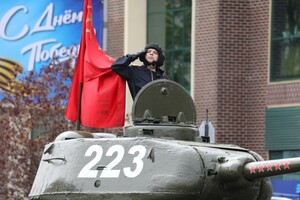Most of the former colonies of the Soviet empire do not want to have any ties with Moscow, and there are good reasons for that.

What's wrong with the Russian Empire ? The British, Spanish and French empires have long since disappeared. And these historically imperialist states have long since come to terms with this development, even if they initially resisted it. Despite the fact that the loss of the empire was sometimes painful, and the exit from the former colonies was even accompanied by bloodshed, the “divorce” was successful. Even if it took decades to implement.
Spain has come to terms with Simon Bolivar and the rise of national sentiment in Latin America. France experienced a similar anti-colonial movement, particularly in Vietnam and Algeria. Britain realized after World War II that it could no longer afford to support the empire. And going out with dignity was the best option, – writes Forbes.
And it turned out that the end of the empire benefited not only the former colonies, but also the colonizers. With some exceptions, Spain, France, and Britain have good relations with the countries they once owned. The colonies never doubted that London, Paris and Madrid had much to offer in bilateral relations. However, things like sovereignty and autonomy were even more important. The colonial rulers were outraged. But after gaining independence, over time, most countries began to interact successfully with the former colonizers. The British Commonwealth has 54 members. The International Organization of La Francophonie covers 88 countries. And Spain has close ties with 20 other Spanish-speaking countries on a variety of issues, from politics to football.
Read also: The Economist: The war in Ukraine is revenge for the quiet death of the Soviet empire
In other words, countries value their historical relations if they can interact with the former colonizer on their own terms. If they are treated with respect and all consultations are sincere, such international associations can benefit both former colonies and colonizers. Of course, there were some mistakes. However, Britain, France and Spain have dealt with them.
Why did Russia take a different path in the post-imperialist world? When the Soviet Union collapsed and the countries that broke out of the Soviet empire gained freedom of choice, many of them showed a strong desire to avoid ties with Moscow. None of the Warsaw Pact countries wanted to maintain a defense alliance with Russia. The Kremlin must have found it difficult to accept such outright rejection. After all, the USSR provided these countries with weapons and training for many decades. But, apparently, he could not develop a friendship or a strong relationship. East Germany was peacefully absorbed by Germany. And all Warsaw Pact countries joined NATO in the decade between 1999 and 2009.
This pattern goes beyond the Warsaw Pact. Because Lithuania, Latvia and Estonia, which were once members of the USSR, also became members of NATO. However, Russia has not lost everything. It built a CSTO defense alliance with Belarus, Armenia, Kazakhstan, Kyrgyzstan, and Tajikistan.
Why did Britain, France, and Spain succeed in total, and why did Russia fail miserably in postcolonial relations? Some supporters of Vladimir Putin claim that the collapse of the Soviet Union was provoked by the United States or other sinister intentions. But, most likely, the explanation is completely different.
First, imperialism is not only a political structure, but also an approach. France, Britain and Spain apologized to their former colonies and offered to help. Russia denies the accusations against itself. She insists that, for example, the conquest of Poland and other countries was necessary and even welcomed by the local population.
Secondly, the internal experience of an open society and open political systems is important. Britain, Spain and France are thriving democracies with broad freedoms guaranteed. These countries are not afraid of differences of opinion. And they are well-tempered when it comes to diversity. Unfortunately, Russia has become less tolerant and less open under Putin. Not surprisingly, it does not tolerate criticism from former colonies.
Third, Russia is completely incompetent in measuring soft power. Russia has a large number of world-class grandmasters and engineers. Why doesn't it offer its analogue Rhodes Scholarship for Engineers? Where is her Fulbright program for mathematicians? Russia dominates trade relations with the former colonies. The United States offered trade privileges to the Caribbean. Where is the similar Russian program for Eastern Europe and Central Asia?
Read also: President of Latvia: “Russia demonstrates its intention to restore the Soviet empire”
And, finally, the problem of leadership. Harold Wilson wrote The Wind of Change and was able to help Britain abandon colonialism in Africa. Charles de Gaulle dedicated his presidency and life to completing France's withdrawal from Algeria. These statesmen were well aware that the great powers were truly “great” not because they could impose their will by force, but because they refrained from doing so.
The war against Ukraine illustrates well the Russian post-imperialist failure. Russia is unable to accept the death of the empire, unable to try to build equal relations with the former colonies. She still supports the imperialist myth that her occupation authorities were “happy.” Russia needs De Gaulle. But it has Bonaparte.




